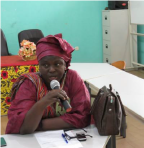
To support the government of Guinea (GOG) to increase the volume of diamonds entering into the formal chain of custody, the Property Rights and Artisanal Diamond Development Project (PRADD) II, in collaboration with the Kimberley Permanent Secretariat of Guinea, launched a series of training sessions on the Kimberley Process and its Certification Systems (KPCS). The first two sessions of this series were held on December 15—16, 2014 in Conakry for sixty (60) participants, including brokers, collectors, and diamond dealers and other influential members from the two unions working on diamonds and gold in Guinea (Union nationale des diamantaires et orpailleurs—UNADOR and Confédération nationale des diamantaires et orpailleurs de Guinée—CONADOG).Two modules were developed: 1) General Concepts of the KP and 2) The Internal Control System of the KP in Guinea. Each module was developed and presented in detailed themes (twelve themes in total) in French, followed by translations in local dialects (Mandingo, Soussou and Fulani). To help spread the word about the training sessions, leaders of the two unions invited the public and private media for coverage and covered all of their costs.
In response to an introductory question on whether anyone had previously heard of the KP, participants responded, “Yes,” but Ibrahima Kalil Diakité of UNADOR hurried to say, “We have heard of the Kimberley Process before but we have never received any training on the KP. That is the reason why some people confuse the Kimberley Process with Kimberlite”. Another participant followed up, “Do not confuse the Kimberley Process and Kimberlite, which is a rock. We are here to learn about the Kimberley Process.” To further highlight the lack of information about the KP and of communication with the Government and the actors, Seny Kaba of UNADOR added, “The state is not looking after us. There is no communication between the state and the socio-professional structures. This creates disorder in the ASM sector. That is the reason why everyone acts based on his/her own understanding of the rules and regulations, which is not normal”. Youssouf Diaby added, “We have the impression that the state is totally absent in the ASM sector. That is why the government does not make any effort. Fortunately for us the PRADD project has arrived. We hope that the project will facilitate establishing the link between us and the government”.
Along these lines, the expectations from the participants were diverse, including: better understanding of all of the aspects and principles of the KP and its certification system; clear understanding of the difference between the KP and Kimberlite; improved information and communication mechanisms with the Government; and broad technical and material support to the sector by the project.
At the end of the training sessions, participants were not shy in expressing their enthusiasm. Cheick Bandian Kourouma of UNADOR noted that “The project has taught us what the KP is about and what its importance is. We will be very proud to pass this knowledge to our other colleagues who did not attend this session.” Fodé Traoré of CONADOG said, “This is the best training session because understanding what the KP is about and respecting it are a warranty for our profession and for all of the artisanal miners.” Madame Salimatou Sall of UNADOR also added that “The lack of communication, information and training has impacted our understanding of the KP. From today, we will be able to comply with the rules of the KP, but we request support from the PRADD II project on this matter.”
Following the report about the training sessions broadcast on public and private TV stations, the Vice President of CONADOG called the Country Director to express his enthusiasm and great satisfaction for providing such training to his colleagues and associates. He noted that similar training sessions will greatly improve the collaboration between different actors of the diamond sector and enhance the information and communications between the actors of the sector and the government of Guinea. Not long after this phone call, the Head of the Precious Minerals Division at the Customs called the KP Focal Point to express his interest in participating in similar training sessions, which was already planned by the project anyway.
These first two training sessions underlined the importance of communication and information exchange between various actors involved in the artisanal mining sector. They also highlighted the need to review and strengthen the policy and institutional framework governing the ASM sector.
In the coming months, PRADD II is planning to review and readjust the training modules based on lessons learned from the first two sessions and to deliver trainings to various actors at the national and local levels, both in Conakry and the countryside.

